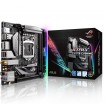Soldato
- Joined
- 6 Jan 2013
- Posts
- 22,401
- Location
- Rollergirl
I'm in the middle of a project right now and I'm considering selling one of my systems and dusting down my Parvum ITX case (Veer 1.0). It'll be a full custom water build and GPU will be my existing 1080ti running 3440*1440 @ 100Hz.
Disregarding budget, what would be the #1 choice for an ITX motherboard right now?
I'm seeing various choices in X299 and X370 which would mean a new CPU purchase too, or I could go X270 and drop my 6700k straight in. Is there something worth waiting for?
Any mini ITX fans who've purchased recently?
My basket at Overclockers UK:
Disregarding budget, what would be the #1 choice for an ITX motherboard right now?
I'm seeing various choices in X299 and X370 which would mean a new CPU purchase too, or I could go X270 and drop my 6700k straight in. Is there something worth waiting for?
Any mini ITX fans who've purchased recently?
My basket at Overclockers UK:







